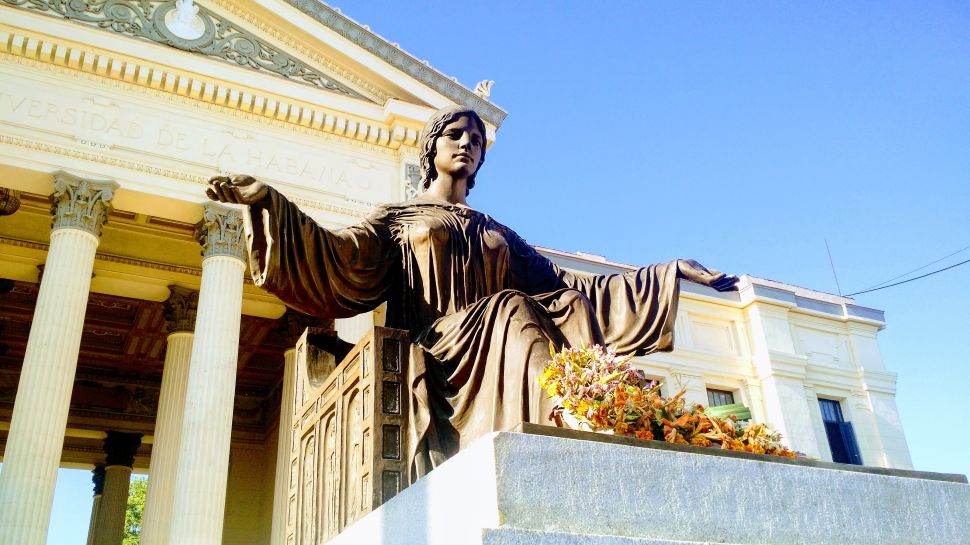
When you don’t have much money in Havana, at least a pizza only runs about 10 national pesos (roughly $.50, in American money). It’s not really what Americans think of as pizza. It is more like a pancake with a smattering of cheese and some red tinted
I arrived in Cuba on December 2, the second day of Delta’s regular service from New York City to Havana. The staff at my gate at JFK were frazzled sorting out the new procedures. I was frazzled, worried that something I’d missed about the Cuba sanctions would prevent me from getting on the plane. What I should have been worried about was finding an ATM.
See, if your citizenship is American, you basically can’t get money in Cuba. I learned this the hard way over five nearly penniless days there. American Airlines and JetBlue were the first with regularly scheduled flights to the Communist nation, as the Wall Street Journal reported. More Americans will head there soon and undoubtedly more will make the same mistake I made. The good news: you can get by. The bad news: I’m not sure what you can do if you find you can’t [Update: There is a way to do it, which we have appended to the end].
Once an American is in Cuba, she cannot get her hands on any more cash than she has on her upon arrival, at least not without begging, borrowing, stealing or a foreign bank account. American credit cards work in very few places. ATMs don’t accept American debit cards. The country still runs on cash.
I showed up in Cuba with a little over $100 in cash on me. At the bureau of exchange, it turned into about 90 CUC—the more valuable of Cuba’s two official currencies. Cuba levies a 10 percent tax on dollars. It would take 50 CUC to get me to the place where I was staying and back to the airport. In other words, I had the equivalent of $9 per day to live on while on the island. Fortunately, my room was already paid for.
This was the first international trip I’d taken alone and it showed.
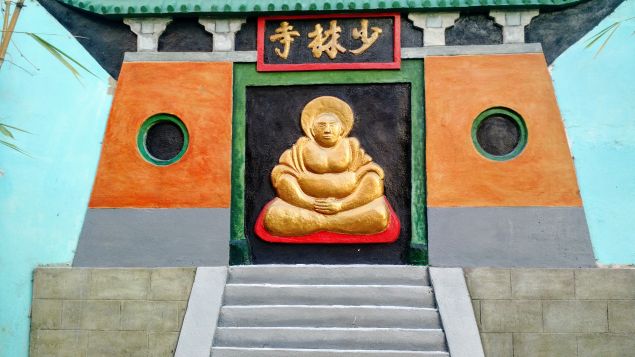
Denial
After I got to the José Martí International Airport in Havana, there were two ATM machines right next to the money exchange. One was out of service. I tried the other. It impressed me how quickly the ATM knew that my debit card was no good. I tried it a few times, just to be sure. Nothing. An American ATM has never figured out that I was worthless so quickly.
I counted out my meager cash out and waited to change it to the local currency. It took extra long because the receipt printer kept jamming and the woman behind the counter couldn’t fix it on her own, so we had to wait for the manager to come back and do it three times. In line, I asked the couple behind me if they knew anything about American banks in Cuba. Before they could answer, an American guy behind them answered on their behalf. “It’s pretty much cash only here, man,” and he gave me this “You’re fucked, bro” look.
“I think there’s only one American bank in Cuba, some bank out of Florida,” the guy I had actually asked the question to added. Stonegate Bank is the only US bank operating in Cuba, but it doesn’t list a branch on its website. Stonegate has not replied to a request for comment.
While waiting in line, I watched another traveler try and fail to use the ATM. More on him later.
John Caulfield, a retired diplomat who headed the Cuba interests section before leaving the foreign service, explained to the Observer that using American credit cards there was forbidden until December 2014. Still, “Most American banks have not validated their cards in Cuba,” he said. He said he personally knows people who have used Stonegate cards there. Visa declined to comment for this story. Mastercard has not returned multiple requests for comment.
Caulfield now serves as a consultant to companies hoping to conduct permitted business with Cuba. The Obama administration, he says, believes it has opened the country up as much as it can without Congress amending the current embargo. In October, the US Treasury Department released this administration’s final updated guidance, which primarily concerns American businesses’ ability to sell goods and services for civilian purposes. But nothing in the new guidance would have made it easier for me to get my hands on a few dollars more.
I taxied to where I was staying, a Casa Particular that I found on Airbnb. My host was a very kind woman named Maria who spoke no English. A Londoner from Portugal who worked for a multinational company was also staying there for one more night. My 24-hour roommate was fluent in Spanish and English. I explained my story to her, and she said that the ATMs worked fine. So she led me to some nearby, but they didn’t work for me.
But a woman at the airport had told me I should try Western Union. So I started walking to Obispo street in Habana Vieja, the most tourist oriented part of the city. My temporary roommate came with me. When we got to the Western Union, it was closing soon, and it had a line of about ten people out front. Anything at all important or institutional in Cuba seems to have a line. So I joined it and my roommate went off on her own errand.
We made plans to meet up again at 6 PM, “for a drink,” even though a ban on alcohol sales was still on because the nation was still in mourning for Fidel Castro.
While I waited in line, I sent my parents in Kansas a couple text messages about my predicament. I told them not to worry but I needed to try to figure out how they could send me some money. I knew they would worry. They did. Sleep was lost. I spent much of my trip worrying about how much my family was worrying—a Midwestern pastime.
Anger
Once inside at the Western Union, I learned that the company’s services are only available to Cuban people. The company has a page about sending money there on its website. No problem, I thought, I can get my host to accept the money for me. I’d happily pay her to do so. So they wrote down all the information I needed to get from her and gave it to me.
I met up with my roommate a few hours later. I told her I couldn’t get any more cash at the money exchange. She said, “I’ll lend you some money before I leave. It’s no problem.” I said that would help a lot.
Money is an awkward topic for me. I have never liked talking about it. I don’t like going to group dinners people because you always end up having to talk about splitting the check. When I lived with other people, I didn’t like dealing with the bills.
When I told her about the idea of my parents sending money to Maria, my host, she said, “Oh, that will be no problem. I’ll explain it to Maria.”
The problem was: I could see a lot of problems. I had to email my parents in Kansas instructions. What if my phone wouldn’t connect? My parents had to understand them exactly. If a problem arose, they just needed to solve it and not email me back to solve it for them. I was going to be asking people in the Midwest to help arrange sending money to a Communist country under a trade embargo. A lot could go wrong. What if the people at Western Union didn’t give me the right information?
That night, I counted out 25 CUC for my taxi ride back on Wednesday. I folded that in with my return visa, my passport and my boarding pass (which serves as proof of health insurance). These were the most important documents in my life. I wondered how anyone had ever had the nerve to travel transcontinental telephone services.
Were these the first problems I had ever had that weren’t #FirstWorldProblems? Forget I asked.
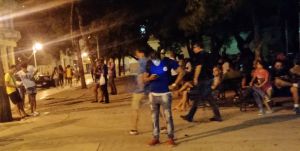
The next morning, my host made an ample breakfast of four fresh fruits, bread rolls, two eggs and ham and cheese. She just laid it out each day. It seemed to be included. I was excited that each day would include one decent meal.
My roommate and I decided to spend the day together until she flew off. First, we went to the Parque Fe del Valle, the nearest access point to a Wi-Fi access point set up by the state telecom, Etecsa. You can always spot these places because there will always be dozens of people bent over their devices and men will repeatedly approach you and ask, “Wi-Fi?” They are selling the cards that enable people to get online. I paid 3 CUC to one such young woman for an access card and, after a couple tries, my Blackberry Priv got online.
I already had an email to my parents drafted. I sent it.
We walked to a bus stop near the Capitolio and spent 5 CUC for a trip to the beach for a couple hours. Once there, I spent 1 CUC on a large bottled
Bargaining
On the bus, my roommate again reiterated that she’d happily lend me some money. I again said that would be great. Even the equivalent of $20 would have been a huge help.
I asked her about the breakfasts. Was it included? She said she thought so, but if it wasn’t it would only be a few CUC each day. The problem was that I didn’t have a few CUC. This fact never seemed to quite get through to my roommate.
When we got back to town, I stopped in the park again to check my email. My parents had written back and said that the Western Union branch in a grocery store they had visited in my hometown had said that all the information I had sent was useless. They needed my host’s birth date. “Please advise,” my mother wrote. As my family would explain after I returned stateside, it was clear that the grocery store didn’t do much Western Union business, particularly not to Cuba. A spokesperson for Western Union later explained to me that, in fact, more than 90 percent of the remittances from the U.S. to Cuba are from Florida.
Whether I advised my parents anything or not, it didn’t matter. That would be the last time I would succeed in communicating with them until I got home. I was never able to successfully email again.
When I got back to the house, my roommate was about to fly away. I told her that my parents hadn’t been able to send money after all and I was worried it wouldn’t work out. She told me it would all be fine and left without lending me anything. I didn’t bring it up either, because, like I said, I have a hard time talking about money. Instead, she asked a friend of Maria’s family (who only spoke Spanish), to tell me some places that I could go out once the mourning period for Fidel had lifted. I stared at him as he spoke words that made no sense to me. She left and the last hope I had of getting my hands on a little more cash went with her.
“Most Americans in this situation in Cuba get help from their fellow tourists,” Caulfield later explained. This would entail admitting my plight to strangers, and I was not made of such stern stuff.
That night, I lay in bed and counted up the 29.70 CUC (not counting the taxi fare) I had left. I also counted out four days I had left: Sunday, Monday, Tuesday and Wednesday or 7.42 per day. This seemed very, very bad, though it was enough if I only required one large bottle and two cheese pizzas per day, but what if something came up?
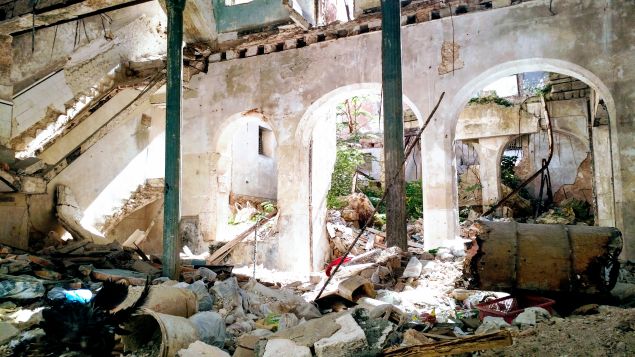
On Sunday, I went walking through Habana Vieja. Outside the Museo de la Revolución, where I stopped for a minute to rest, I met an American woman. We talked about my trip, and she asked why I was only staying in Havana. I lied. She asked me the details on where I was staying, and somehow it became clear that free breakfasts with a room wasn’t the norm in Cuba, at all.
So when I got back to the house that night, I asked my host, through her husband, whether or not breakfasts cost anything. She said it cost 4 CUC. I was crushed. Maria, who understood that I had a problem with money on the trip, said that it was no problem. Her husband, apparently, was less understanding. He was a bit cold to me the rest of my time there. This could have just been my head. I promised them both that I would find a way to pay them for the breakfasts when I got back.
Since returning I have repaid her the money I owed her and then some, via Western Union. I couldn’t do it online, because the company only permits family remittances through its website, but I was able to complete a non-family remittance at a Duane Reade in the Financial District. It was true: I did need Maria’s birthdate. By then, I had it.
That night I would run the numbers of what I had left again. In doing so, I would make a great realization. I didn’t need to factor in Wednesday. All I was going to do on Wednesday was go to the airport. So really I could just calculate for Monday and Tuesday.

I had found a good price on those large
With my newfound ebullience, I returned to the park to do some reporting. I talked to some Cubans about how they used the internet. I talked to some Americans about coming to Cuba. In fact, I met a guy in the park who was in the same situation I was in. He had a tiny little flavor-saver under his lower lip and wouldn’t give his name, though he told me he’d come from New York. In fact, I think he was the one I saw try and fail to get money from the ATM at the airport on Friday.
“It’s just kind of a funny story,” he told me. His itinerary had him in Cuba till the 19th. I hope he is still alive but that maybe his days of trouble have led him to reconsider his choices in facial hair. Then some good might come from our shared misfortune.
I also met two young filmmakers that night. The pair attended school in Switzerland, and they were making a film about the Wi-Fi park. We watched the cops break up a dancing circle that had taken shape before music had yet been re-authorized following the national mourning for Castro. We tried to decipher what happened, and then they asked me if I wanted to meet them for a drink the next night, when it was legal again.
“Yes,” I thought, “I can afford to spend as much as 3 CUC on drinking.”
“Maybe,” I thought, “I could ask them to lend me money?”
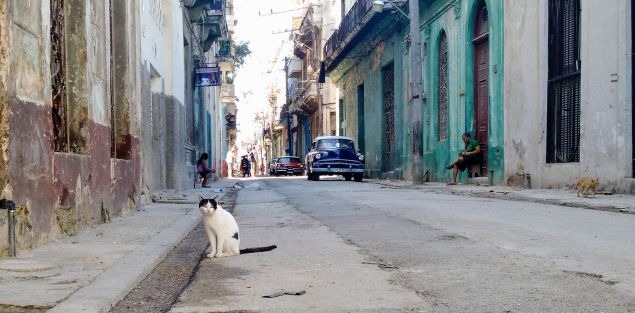
Depression
I spent Monday walking west, through the Vedado neighborhood. I walked along the Malecon and saw people drinking for the first time in nine days by the sea. During the day, when on the move, I didn’t worry so much. It wasn’t so bad just walking around and looking, talking to whomever stopped me, even if I knew it was for a little hustle. I found benches in the shade and drew what I saw. I took a lot of pictures. It wasn’t so bad.
I didn’t ask my drinking buddies for a loan once we met up. What did it matter at that point? I had found a place where the beers definitely cost less than 1 CUC each, but they led me to a fancy place where a woman got up and started singing Spanish versions of Jazz standards. I ended up splashing out 5 CUC that night. High rolling.
There had been moments on the trip when I considered selling some of my electronic devices to get cash. It occurred to me later that I had another asset with me that I might have sold: bitcoin. In 2015, Fernando Villar completed the first documented bitcoin transaction in Cuba, using its public Wi-Fi. I contacted Mike Dupree of Easybit, a bitcoin ATM operator who has visited Cuba several times. He has never successfully managed to sell bitcoin for cash on any of his visits, even when he has posted attractive exchange rates.
“To easily use bitcoin, you need a connection to the internet,” Dupree wrote in an email. “This may be one of the larger barriers to widespread use of bitcoin in Cuba.”
In an email to the Observer, Villar, the pioneer, added his own note of optimism, “I’m still optimistic that things are going to change sooner than later but because of the lack of internet, knowledge of cryptocurrency and tight government controls, it won’t happen for quite some time.”
I never sold any of my stuff because I didn’t know where I could do it. To be honest, all I probably missed out on was some slightly better food and maybe one or two more museums. When I wasn’t wracked with anxiety about an emergency, this is what I told myself: I have had a thousand restaurant meals that I don’t remember, but my financial situation made this trip unforgettable.
Acceptance
On my last day, I went to the National Museum of Fine Arts of Havana, the site devoted to Cuban artists. I took my time, sketching my favorite works and lingering. When I got back to the house, I spent the rest of the night reading, only leaving briefly for my last sad cheese pizza and a couple last glasses of fruit juice. I couldn’t wait to head home.
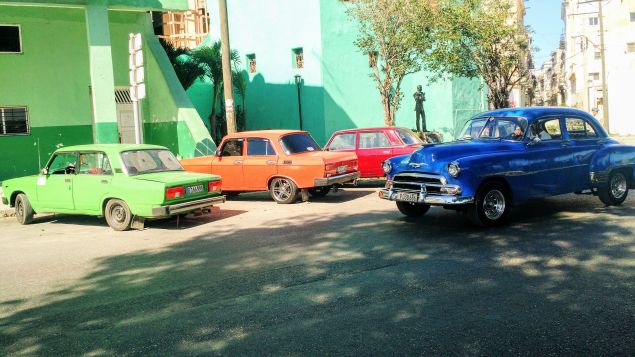
When the cab got me to the airport the next morning, it took me to the wrong terminal. They didn’t know where Delta’s gates were and neither did I. As it happened, a couple from Texas was there, also lost. A staff person suggested we should take a cab to the right terminal, because it was two kilometers off and super hot out. I asked if I could share the cab with them and they agreed.
When we arrived at the correct terminal, the cabbie said it would be 10 CUC. This seemed exorbitant in light of the 25 CUC ride from Havana, but what could we do? The Texans paid it. I gave them 3 CUC. I don’t think it was really my fair share of the ride, but it was the last money I had. A final indignity before I left.
Once I was back in the states, my 24-hour roommate messaged me on WhatsApp from London to ask if I’d ended up enjoying my stay.
“I would say,” I wrote, “it was a valuable experience.”
UPDATE: Since posting this story, the Observer has learned that Americans can have contacts at home send funds via Western Union care of the US Embassy in Cuba. December 14, 2016 4:16PM.

